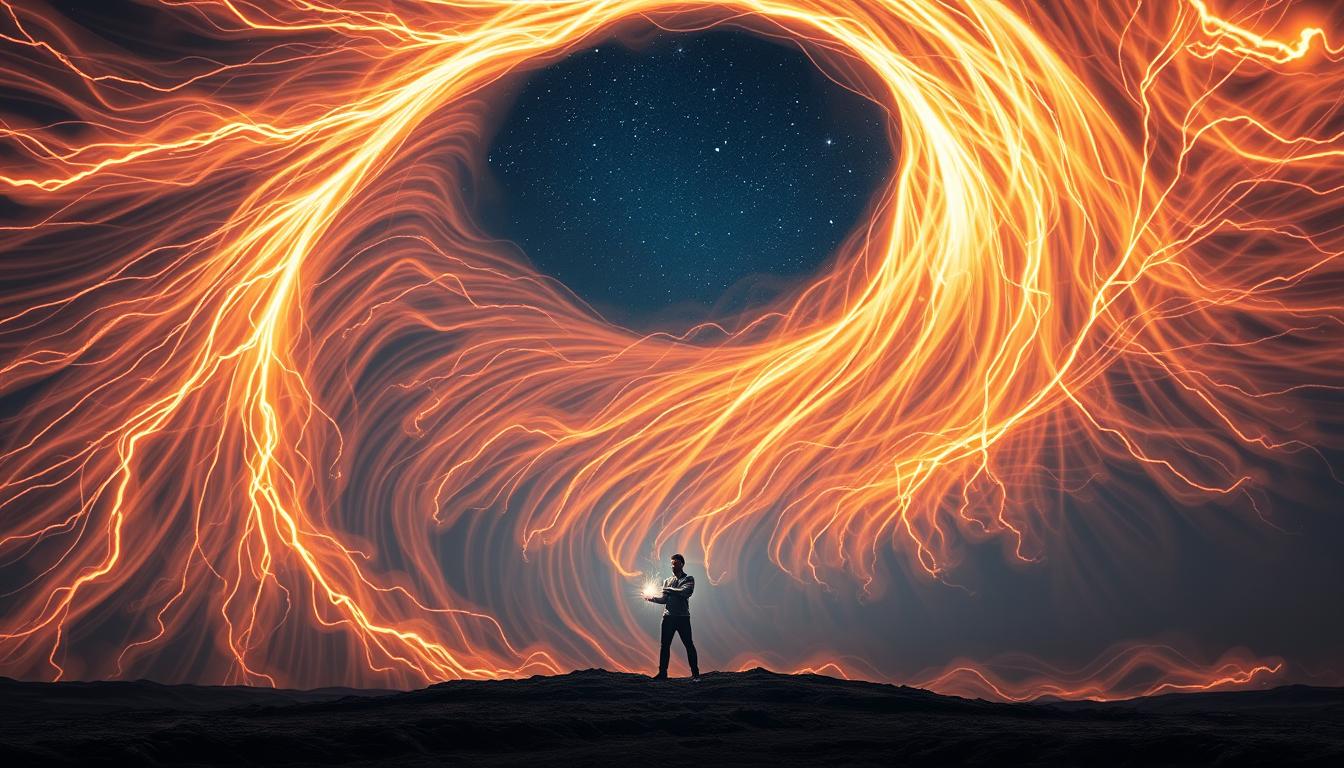Have you ever had a dream that later came true? Or felt a sudden intuition about something before it happened? These experiences might be linked to precognition, a fascinating psi ability that allows some people to perceive future events before they occur.
Throughout history, stories of precognitive visions have appeared in cultures worldwide. From ancient prophecies to modern-day accounts, this phenomenon has sparked curiosity and debate. While science has yet to fully explain it, research continues to explore the possibilities.
This article dives into the mysteries of precognition, examining its historical roots, cultural significance, and scientific investigations. Whether you’re a skeptic or a believer, join us as we explore this intriguing ability and its place in our understanding of the human mind.
Key Takeaways
- Precognition is the ability to perceive future events before they happen.
- It has historical and cultural significance across various societies.
- Scientific research continues to explore the validity of precognitive experiences.
- Many people report having dreams or intuitions that later come true.
- Understanding precognition can provide insights into the mysteries of the human mind.
Introduction to Psi Superpowers
What if some people could sense events before they happen? This idea lies at the heart of psi abilities, a fascinating area of study that explores the human mind’s potential to perceive beyond the ordinary. From dreams that predict the future to sudden intuitions about upcoming events, these experiences have intrigued scientists and skeptics alike.
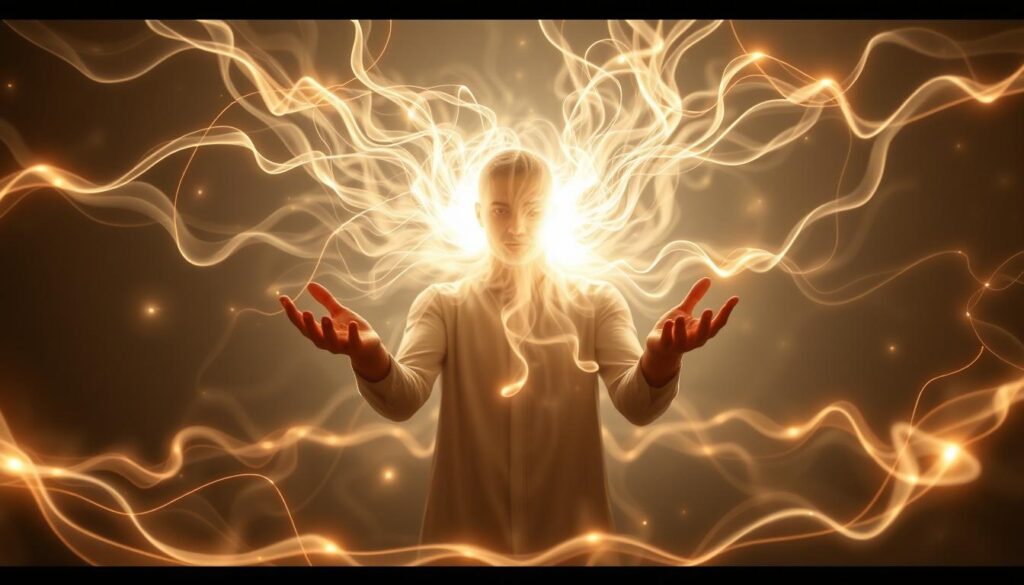
What Are Psi Abilities?
Psi abilities, often grouped under the term extrasensory perception (ESP), refer to the mind’s capacity to gather information without using the known senses. These abilities include telepathy, clairvoyance, and precognition. While some dismiss them as mere coincidence, others believe they offer a glimpse into the untapped potential of the human mind.
For example, a person might have a vivid dream about an event that later unfolds exactly as they saw it. Such experiences, though rare, have been documented across cultures and time periods. Early experiments, like those conducted by J.B. Rhine at Duke University, aimed to test these abilities scientifically, though results remain debated.
An Overview of Precognitive Phenomena
Precognition is a specific type of psi ability where a person perceives future events before they occur. Unlike clairvoyance, which involves seeing distant objects or events, precognition focuses on the future. It often manifests through dreams or sudden visions, leaving the individual with a sense of certainty about what’s to come.
“The mind is capable of extraordinary feats, and precognition might be one of its most mysterious expressions.”
Early studies, such as the Census of Hallucinations in 1894, revealed that nearly 10% of participants reported experiencing visions of future events. While science continues to explore these phenomena, the debate over their validity remains unresolved. Whether you view them as coincidence or evidence of a deeper connection, precognitive experiences continue to captivate our imagination.
The Origin and Meaning Behind Precognitions
Where does the idea of seeing the future come from? The concept of precognition has deep roots in human history, stretching back to ancient civilizations. From dreams that foretold events to visions of what’s to come, this phenomenon has fascinated people for centuries.

Historical Definitions and Etymology
The word precognition comes from the Latin term praecognitio, which means “knowing beforehand.” This idea of foreknowledge has appeared in various forms across cultures and time periods. In ancient Rome, dreams were often seen as messages from the gods, while in medieval Europe, they were linked to divine prophecy.
Early religious texts, like the Bible, contain accounts of individuals who experienced future events through visions or dreams. For example, Daniel’s interpretation of dreams in the Old Testament is a classic example of this belief. These stories reflect the longstanding human interest in predicting what lies ahead.
“The ability to see the future has always been a subject of both wonder and skepticism.”
In Scots law, precognition referred to the process of gathering evidence before a trial. This legal use of the term highlights its connection to the idea of knowing something in advance. Over time, the meaning evolved to include the ability to perceive future events through extrasensory means.
- The Latin root praecognitio emphasizes the concept of knowing beforehand.
- Historical accounts show that dreams and visions were often seen as divine messages.
- Scots law used the term to describe the gathering of evidence before a trial.
Today, precognition is a controversial topic in science and psychology. While some view it as a genuine phenomenon, others dismiss it as pseudoscience. Despite the debate, the human fascination with predicting the future remains strong, proving that this ability continues to captivate our imagination.
Exploring the Science of Precognitions
Can the human mind truly glimpse into the future? This question lies at the heart of scientific investigations into precognition. While many dismiss it as mere coincidence, others believe it could be a natural ability tied to how our brains perceive time.
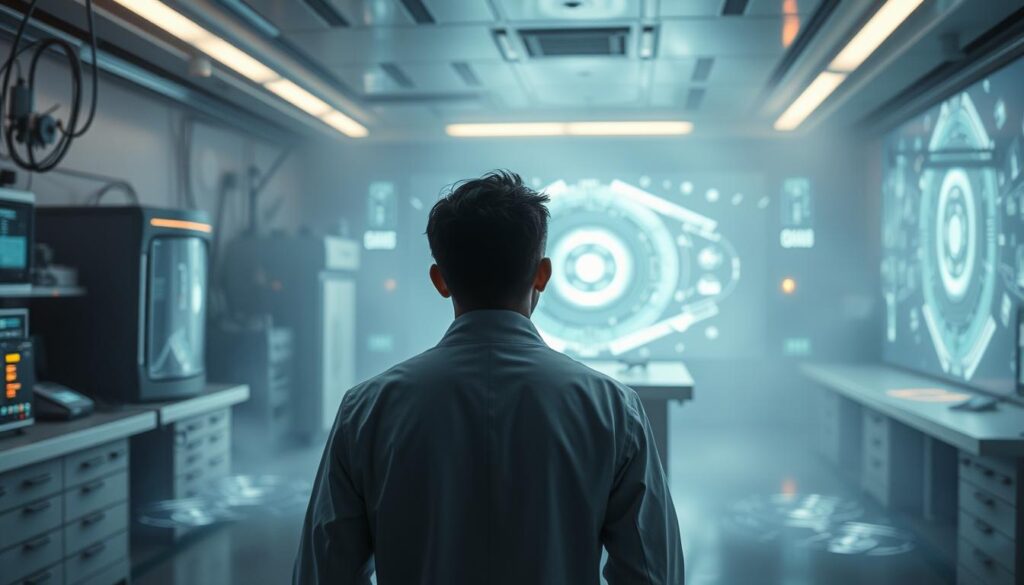
Neuroscience and Temporal Concepts
Neuroscience suggests that our brains process time in complex ways. Some theories propose that precognition might be linked to the brain’s ability to anticipate future events based on patterns. For example, a dream might feel predictive because the mind is subconsciously analyzing past experiences.
Quantum theory adds another layer to this debate. Concepts like retrocausality suggest that effects could precede causes, challenging traditional views of time. While this idea remains controversial, it offers a potential explanation for how precognition might work.
Criticism and Evidence in Research
Landmark experiments, such as those by J.W. Dunne and Daryl Bem, have attempted to test precognition scientifically. Bem’s studies, for instance, showed statistically significant results, suggesting that participants could predict future events. However, critics argue that these findings might be due to flawed methodologies or statistical anomalies.
One major criticism is that precognition violates the principle of causality, which states that causes must precede effects. This makes it difficult for many scientists to accept the phenomenon as valid. Despite this, meta-analyses of multiple studies have shown consistent, though small, effects supporting the existence of precognition.
“The evidence for precognition is intriguing but not yet conclusive. It challenges our understanding of time and causality.”
Creating controlled experiments in parapsychology is another challenge. Factors like participant bias and the difficulty of isolating variables make it hard to produce definitive evidence. Yet, the ongoing research continues to push the boundaries of what we know about the human mind.
- Neuroscience explores how the brain perceives time and processes information.
- Quantum theory suggests retrocausality as a potential mechanism for precognition.
- Critics argue that precognition violates the principle of causality.
- Landmark experiments show mixed results, with some supporting the phenomenon.
While the debate over precognition remains unresolved, the science behind it continues to evolve. Whether it’s a genuine ability or a trick of the mind, the study of precognition offers fascinating insights into the mysteries of human consciousness.
Historical Perspectives on Dream Precognition
Throughout history, dreams have been seen as windows into the future. From ancient prophecies to modern-day accounts, the idea that dreams can predict future events has fascinated humanity. This section explores how different cultures and time periods have interpreted these experiences.

Antiquity and Early Accounts
In ancient civilizations, dreams were often considered divine messages. For example, the story of Joseph in the Old Testament highlights how dreams were used to predict future events. Joseph’s ability to interpret dreams saved Egypt from famine, showcasing the power of this phenomenon.
Similarly, in ancient Greece, dreams were seen as a way for the gods to communicate with mortals. The Oracle of Delphi, known for her prophetic visions, often relied on dreams to deliver her messages. These early accounts reflect the belief that dreams could reveal what was to come.
“Dreams are the touchstones of our character.” – Henry David Thoreau
Notable Experiences from the 17th to 20th Centuries
By the 17th century, dreams began to be studied more systematically. One notable example is the case of Abraham Lincoln, who reportedly dreamed of his own assassination days before it occurred. This experience has been widely discussed as evidence of precognition.
In the early 20th century, public interest in dream research grew. John William Dunne’s 1927 book, “An Experiment with Time,” documented numerous cases of precognitive dreams. Dunne argued that anyone could learn to experience these dreams, making the ability accessible to all.
- Joseph’s prophetic dreams in the Old Testament.
- Abraham Lincoln’s dream of his assassination.
- John William Dunne’s groundbreaking research on precognitive dreams.
These historical accounts have shaped both scientific inquiry and cultural perceptions of the future. Whether viewed as divine messages or subconscious predictions, dreams continue to captivate our imagination.
Real-Life Applications and Personal Experiences
Have you ever felt a sudden sense of knowing something before it happened? This feeling, often described as a premonition, has been reported by many people throughout history. These experiences, whether through dreams or sudden visions, raise questions about the human mind’s ability to perceive the future.

Case Studies and Personal Accounts
One of the most compelling examples of precognition is the Aberfan disaster of 1966. Before the tragic event, 76 individuals reported dreams or visions of the disaster. Eryl Mai Jones, a young victim, told her mother about a dream where her school was covered by something black. This account was later validated as a genuine experience.
Another notable case involves Victor Amole, who dreamed of specific lottery numbers (3-10-17-26-32) and won. The odds of this happening were 1 in 278,256, making it a striking example of precognition. These stories highlight how such phenomena can impact people’s lives in profound ways.
“The mind’s ability to perceive the future remains one of its most mysterious capabilities.”
While these accounts are fascinating, skepticism surrounds their validity. Critics argue that they could be coincidences or false memories. However, research has shown that physiological changes, like increased heart rate, can occur seconds before emotional events. This evidence suggests that the mind might have a way of anticipating the future.
For those who experience precognition, the psychological impact can be significant. Some report feelings of anxiety or confusion, while others find clarity in their visions. These experiences often lead to changes in decision-making, as individuals act on their feelings to avoid potential harm or seize opportunities.
- The Aberfan disaster and Eryl Mai Jones’ dream.
- Victor Amole’s lottery win based on a dream.
- Physiological changes before emotional events.
- The psychological impact of precognitive experiences.
Whether viewed as a genuine phenomenon or a trick of the mind, precognition continues to captivate our imagination. These real-life accounts remind us of the mysteries that still surround the human mind and its potential to perceive the future.
Precognition in Popular Culture and Literature
From novels to blockbuster films, precognition has long been a source of inspiration. This mysterious ability to see the future has captivated creative minds, shaping stories that explore the unknown. Whether through dreams or sudden visions, the theme of precognition continues to influence art, literature, and science fiction.

One of the most iconic examples is Philip K. Dick’s The Minority Report. This story, later adapted into a film, explores a world where precognition is used to prevent crimes before they occur. The narrative raises questions about free will and the ethics of predicting the future, making it a cornerstone of science fiction.
Influence on Art and Science Fiction
Science fiction authors have often drawn on precognition to fuel their work. H.G. Wells’ The World Set Free envisioned the atomic bomb decades before its creation. Similarly, Morgan Robertson’s Futility eerily predicted the sinking of the Titanic. These works highlight how creative expression can blur the line between fiction and reality.
“The ability to see the future has always been a subject of both wonder and skepticism.”
In film, precognition has been a recurring theme. Movies like Inception and Donnie Darko explore the complexities of time and perception. These artistic interpretations not only entertain but also challenge viewers to question the nature of reality.
| Work | Medium | Key Theme |
|---|---|---|
| The Minority Report | Novel/Film | Crime prevention through precognition |
| The World Set Free | Novel | Prediction of atomic energy |
| Inception | Film | Dream manipulation and time perception |
These examples show how precognition has shaped public perception. While some view it as a genuine phenomenon, others see it as a tool for storytelling. Either way, its influence on popular culture is undeniable.
For more insights into the mysteries of the mind, visit Hannah Brites. Whether you’re a skeptic or a believer, the interplay between creative expression and precognition offers endless fascination.
Research and Emerging Theories on Precognitions
What drives scientists to explore the mysteries of seeing the future? The study of precognition has sparked both fascination and skepticism, leading to groundbreaking experiments and innovative theories. From high-speed random event generators to quantum mechanics, researchers are pushing the boundaries of what we know about time and perception.
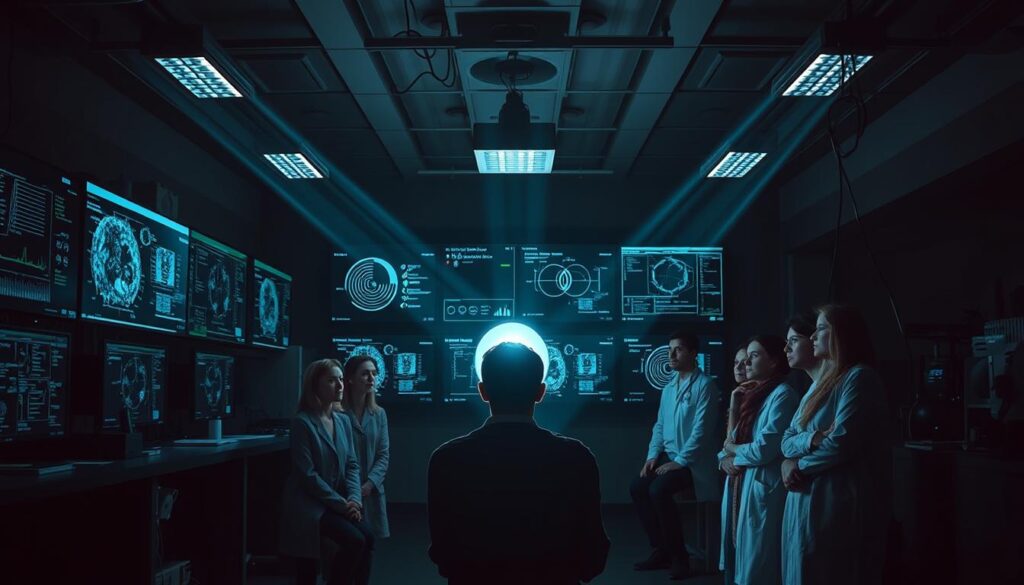
Landmark Experiments
One of the most notable studies in this field was conducted by Daryl Bem in 2011. His experiments showed that participants could predict future events with accuracy above chance. For example, students guessed which curtain hid an erotic image more accurately than random guessing. These findings, though controversial, opened the door for further study.
Another key experiment involved high-speed random event generators. Researchers tested whether participants could influence the outcome of these machines before they were activated. The results, while small, suggested a potential link between human intention and future events.
Debates in Parapsychology
The field of parapsychology has faced significant criticism, particularly regarding the reproducibility of results. Critics argue that many experiments, including Bem’s, suffer from methodological flaws or statistical anomalies. However, meta-analyses of multiple studies have shown consistent, though modest, effects supporting precognition.
“The evidence for precognition is intriguing but not yet conclusive. It challenges our understanding of time and causality.”
Some researchers suggest that precognition might be linked to quantum theory. Concepts like retrocausality propose that effects can precede causes, offering a potential explanation for these phenomena. While this idea remains speculative, it continues to inspire innovative research.
Innovative Approaches in Modern Research
Modern technology has revolutionized the way scientists study precognition. Brain-computer interfaces and advanced statistical methods are now being used to test these abilities in controlled environments. For example, presentiment experiments measure physiological changes, like heart rate, before emotional events occur.
These innovative approaches aim to provide more robust evidence and address the criticisms of earlier studies. By combining traditional methods with cutting-edge technology, researchers hope to unlock the secrets of this mysterious ability.
| Experiment | Key Finding | Year |
|---|---|---|
| Daryl Bem’s Studies | Participants predicted future events above chance | 2011 |
| High-Speed Random Event Generators | Human intention influenced outcomes | 2014 |
| Presentiment Experiments | Physiological changes preceded emotional events | 2012 |
For more insights into the mysteries of the human mind, visit Hannah Brites. Whether you’re a skeptic or a believer, the study of precognition offers endless fascination and new perspectives on the nature of reality.
Psychological Explanations and Alternative Theories
Why do some people feel they can predict the future? While precognition is often attributed to supernatural abilities, psychology offers alternative explanations. These theories focus on how the mind processes information and interprets experiences, often leading to the sensation of foreknowledge.
One common explanation is cognitive bias. Our brains are wired to find patterns, even in random events. This tendency, known as apophenia, can make a dream or experience seem predictive when it’s just coincidence. For example, a person might remember a dream that aligns with a future event but forget countless others that didn’t.

Selective memory also plays a role. People are more likely to recall instances where their intuition or premonition seemed accurate. This selective recall reinforces the belief in precognition, even though most predictions are forgotten or dismissed.
Another theory involves unconscious perception. Our brains constantly process information below the level of conscious awareness. This can lead to a sense of knowing something before it happens, as the mind pieces together subtle cues. For instance, a person might unconsciously notice signs of an impending event, leading to a feeling of precognition.
“The mind’s ability to find meaning in randomness often leads to the illusion of foreknowledge.”
Emotional states, such as stress or loss of control, can also heighten the belief in precognition. When people feel uncertain, they may seek patterns or predictions to regain a sense of stability. This emotional need can make coincidental experiences feel more significant than they are.
Psychological explanations often contrast with traditional supernatural interpretations. While supernatural theories suggest a direct connection to the future, psychological theories focus on the mind’s internal processes. Both perspectives offer valuable insights, but neither has conclusively proven the existence of precognition.
| Psychological Explanations | Supernatural Interpretations |
|---|---|
| Cognitive biases and pattern recognition | Divine or spiritual insight |
| Selective memory and recall | Direct access to future events |
| Unconscious perception of cues | Paranormal abilities |
Despite ongoing research, the limitations of current studies make it difficult to prove precognition definitively. Many experiments face challenges like participant bias and the difficulty of isolating variables. While psychological theories provide plausible explanations, the mystery of precognition continues to captivate both scientists and the public.
Understanding the Difference: Precognition vs. Premonition
Have you ever wondered if there’s a difference between knowing the future and feeling it? While both precognition and premonition involve sensing future events, they are distinct phenomena. Understanding these differences can shed light on how the human mind perceives the unknown.

Defining Key Terms
Precognition refers to the ability to perceive specific future events before they happen. It often occurs during sleep, particularly in dreams, and involves a deep sense of knowing. For example, Abraham Lincoln reportedly dreamed of his assassination days before it occurred, a classic case of precognition.
On the other hand, a premonition is a vague feeling or sense of forewarning, often described as a “gut feeling.” It typically happens during waking hours and is characterized by anxiety or unease. Studies show that about 30% of people report experiencing premonitions, with 60% describing them as negative or dangerous.
Comparative Analysis and Impact
While both phenomena involve future events, their nature and impact differ significantly. Precognition is precise and detailed, offering clear insights into what’s to come. In contrast, premonitions are more general, leaving the person with a sense of urgency but no specific details.
“The mind’s ability to perceive the future can manifest in both precise visions and vague feelings, each with its own implications.”
For instance, a dream about a specific event, like winning the lottery, is an example of precognition. A sudden feeling of dread before a car accident, however, would be classified as a premonition. These distinctions are crucial in both academic research and personal decision-making.
| Aspect | Precognition | Premonition |
|---|---|---|
| Timing | Occurs during sleep | Happens during waking hours |
| Nature | Specific and detailed | Vague and emotional |
| Examples | Dreams of future events | Gut feelings or anxiety |
Conflating these terms can lead to misunderstandings in both scientific studies and everyday life. By recognizing their differences, we can better appreciate the complexities of the human mind and its ability to perceive the future.
Case Studies and Analysis from the United States
What does modern science say about the ability to see the future? In the United States, researchers have conducted groundbreaking experiments to explore precognition, the phenomenon of perceiving future events before they occur. These studies aim to uncover whether this ability is real or simply a trick of the mind.
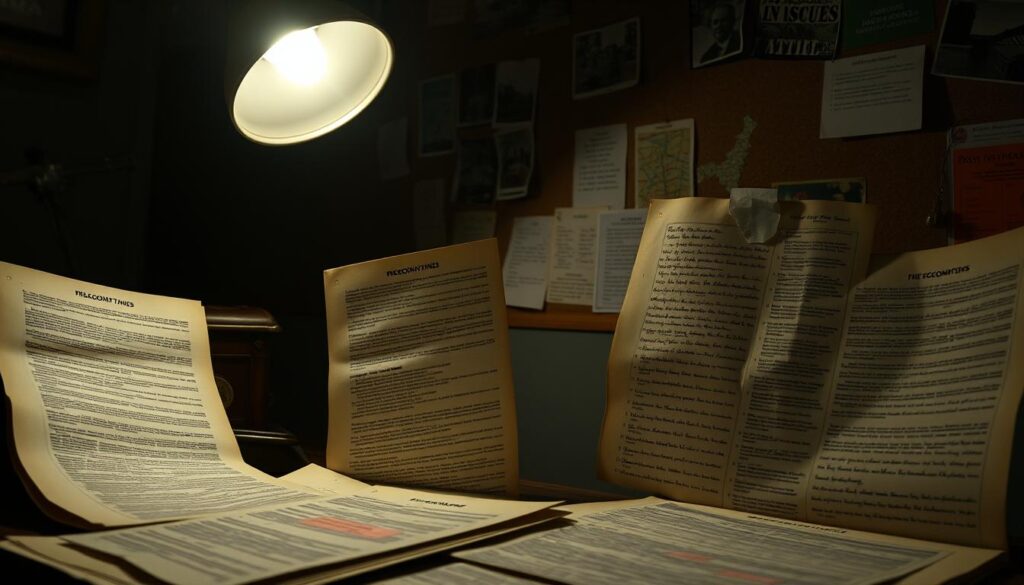
One of the most notable studies was led by Daryl Bem in 2011. His experiments suggested that participants could predict future events with accuracy above chance. For example, students guessed which curtain hid an erotic image more accurately than random guessing. While these findings sparked excitement, they also faced criticism for potential methodological flaws.
Modern Experiments and Findings
Recent research has focused on presentiment, the idea that the body can react to events before they happen. A meta-analysis by Mossbridge et al. (2012) reviewed multiple studies and found small but significant effects. Participants showed physiological changes, like increased heart rate, seconds before viewing emotional images.
However, not all studies have been conclusive. Many replication attempts of Bem’s work failed, raising questions about the reliability of these findings. Critics argue that biases, such as selective reporting, may influence the results. Despite this, the debate continues to inspire new research.
“The evidence for precognition is intriguing but not yet conclusive. It challenges our understanding of time and causality.”
In 2014, a study involving the Dow Jones Industrial Average made headlines. Ten participants predicted market movements correctly in all seven trials, earning a profit of $16,000. While impressive, skeptics questioned whether this was luck or evidence of precognition.
- Daryl Bem’s 2011 study suggested participants could predict future events.
- Presentiment experiments showed physiological changes before emotional events.
- Replication attempts have produced mixed results, fueling ongoing debate.
These studies have had a significant impact on public opinion. While some view precognition as a genuine ability, others remain skeptical. The research has also influenced popular media, with shows and documentaries exploring the science behind these phenomena.
In summary, modern American research on precognition has made strides but remains controversial. Whether it’s a real ability or a product of the mind’s complexity, the study of precognition continues to captivate scientists and the public alike.
Conclusion
The mystery of predicting the future has fascinated humanity for centuries. From ancient dreams to modern scientific studies, the idea of precognition continues to captivate our imagination. Historically, cultures worldwide have interpreted these experiences as divine messages or subconscious insights.
Scientific research, like Daryl Bem’s experiments, has explored the validity of precognition. While some findings suggest a connection to future events, skepticism remains due to challenges in replication and methodology. This ongoing debate highlights the complexity of studying such phenomena.
In popular culture, precognition has inspired countless stories, from literature to film. These portrayals reflect our enduring curiosity about the unknown and the human desire to understand time and perception.
As research evolves, it’s essential to approach these ideas with both curiosity and critical thinking. Whether a person believes in precognition or views it as a trick of the mind, exploring these experiences offers valuable insights into the mysteries of human consciousness.

